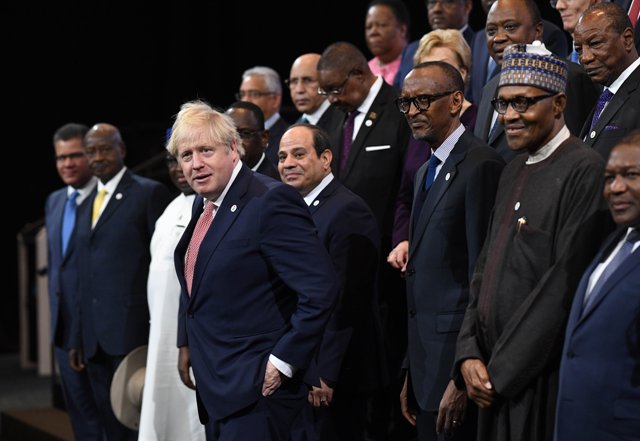 Boris Johnson to African leaders at a January African Investment Summit: “Together let us write the next chapter for my country, for your country, and above all, for all the peoples of our countries.” [photo: UK Government]
Boris Johnson to African leaders at a January African Investment Summit: “Together let us write the next chapter for my country, for your country, and above all, for all the peoples of our countries.” [photo: UK Government]
Peter Clegg, the guest Editor of a special Journal edition on Brexit and the Commonwealth writes: Back in June 2016 after the decision of UK voters, or least 52% of them, to leave the EU, The Round Table got to work and produced a special issue, entitled ‘Brexit and the Commonwealth: What Next?’ The issue drew on expertise from across the Commonwealth to provide an initial assessment of how the decision might impact the UK’s relations with Africa, the Caribbean, and the Pacific. It also considered the position of the UK Overseas Territories; although not members of the Commonwealth they have a close association with it. The focus on the Commonwealth was important, not just due to the particular interests of the journal, but also because the Commonwealth featured heavily in the referendum campaign, particularly from those who believed the UK’s future should be outside of the EU. They claimed that a vote for Brexit would allow the UK to re-new and extend links with the countries of the Commonwealth.
There was and is still a hope by many that, unshackled from Europe, the UK will shape a dynamic and successful future relationship with the countries of the Commonwealth. This view was represented by several contributors to the special issue, and illustrated what many genuinely feel that the links between the Commonwealth and the UK have great potential for growth. This may well be the case but other contributors highlighted the potential limitations of a new bilateral link, and that in many instances the UK’s role across the Commonwealth had greater breadth and depth as a result of its membership of the EU. The tension between aspiration and reality was a key theme of the special issue.
When the articles and opinion pieces were written, the precise details of what would come next were uncertain, although we had the statement from then UK Prime Minister Theresa May that “Brexit means Brexit”. Today, the position is not much clearer in terms of how the UK will develop a successful and autonomous trading policy, with not just the countries of the Commonwealth, but also the EU and the rest of the world. There is still a sense as Prime Minister Boris Johnson said previously that the UK can “have our cake and eat it”. However, soon tough decisions will need to be made, and the impacts of those decisions will become more evident over the next few months. What this means for the countries of the Commonwealth and the Overseas Territories remains opaque.
If one looks at some of the recent stories and comments about UK relations with the Commonwealth after the transition agreement with the EU expires, there is a combination of continuity, wishful thinking, and vulnerability. In terms of continuity the UK is attempting to roll over the provisions of existing EU trade deals, before starting to discuss new arrangements. Some progress has been made (e.g. with CARICOM and Southern Africa Customs Union and Mozambique), but there is more work to do. There are also some unlikely suggestions, such as the Overseas Territories being incorporated into the UK, or that Gibraltar might be able to retain access to the EU’s Schengen area. Finally, there is vulnerability as indications are that the UK will be pressurised by Commonwealth partners, such as Australia and India, to give significant ground in any new trade deals.
As the day of the UK’s departure from the EU nears, there is still much to play for in terms of shaping the policy debate in relation to future UK-Commonwealth relations, and much of the analysis that was presented in the special issue retains currency. Therefore, we take this opportunity to make available several contributions from the issue that might help to inform what comes next.
Special edition introduction by Peter Clegg
Access the special edition
Special edition highlights – Round Table website
Myths of Commonwealth Betrayal: UK–Africa Trade Before and After Brexit by Peg Murray-Evans
The Implications of Brexit for the Caribbean’s Future Relationship with Britain and the EU by Sir Ronald Sanders
Australia and Brexit: Déjà Vu All Over Again? By Derek McDougall
Brexit and the Overseas Territories: Repercussions for the Periphery by Peter Clegg
Related articles:
Brexit and the Commonwealth: The Round Table looks at what’s next
2019 book review: English Nationalism, Brexit and the Anglosphere: Wider Still and Wider by Derek McDougall
2018 – Brexit: Challenges and Opportunities for Small Countries and Territories by Matthew L. Bishop and Peter Clegg
2017 – Brexit: Unintended and Unanticipated Consequences by Nicholas Watts



